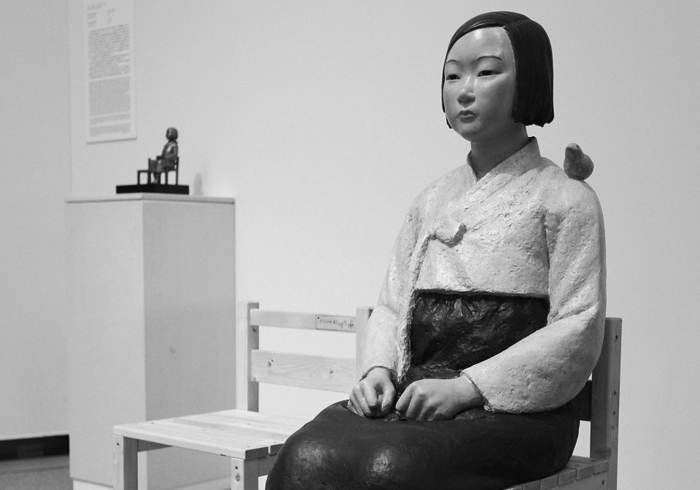In an ironic turn of events, the organisers of the 2019 Aichi Triennale in Japan have closed down After ‘Freedom of Expression’?, an exhibition tracing the history of censored artwork in Japan, three days after its opening at the Aichi Prefecture Museum of Art in Nagoya. According to the Japan Times, the decision was made for safety concerns, after the triennale received a flurry of threats over the inclusion of a sculpture of a ‘comfort woman’ sculpture in the exhibition. The Japanese newspaper also points to political pressure following a statement by mayor of Nagoya Takashi Kawamura, in which he demanded the closure of an exhibition which ‘tramples on Japanese people’s feelings’.
Statue of a Girl of Peace by Korean artists Kim Seo-kyung and Kim Eun-sung was made in reference to the Korean women who were sexually enslaved by the Japanese Imperial Army during the Second World War – euphemistically called ‘comfort women’. The sculpture depicts a teenage girl sat on a chair, with clenched fists and a bird on her shoulder, and the original version was made in 2011 to mark the 1,000th Wednesday demonstration in front of the Japanese embassy in Seoul, demanding a sincere apology and compensation from the Japanese government for the surviving victims and their descendants. Since then, other versions of the statue have been placed around the country and internationally, including at the Tokyo Metropolitan Art Museum where a member of staff destroyed a miniature version of the work, claiming it violated the museum’s policies.
The exhibition’s curators have contested the triennale’s decision to close down the show, saying it constituted ‘the most significant censorship case in the post-war Japan era’, while over 70 artists participating in the triennale have penned a letter to the organisers denouncing ‘menacing acts and intimidation’, and insisting that the show remain open. Both the curators and signatories are arguing for mediation and the organisation of a public assembly to discuss the situation.
Tensions around the subject of comfort women have escalated amid strained diplomatic relations between Japan’s rightwing Prime Minister Shinzo Abe, who refused to renew an apology to the victims, and South Korea’s leftwing government. In 2015, former Korean Prime Minister Park Geun-hye agreed for a foundation to be set up for the victims which would be funded by Japan, a settlement which was widely decried as unsatisfactory. On 5 July of this year, South Korea officially dissolved the US$8.8 million foundation amid ongoing disputes over reconciliation.
On 8 August, Gwangju Biennale Foundation released an international statement criticising the closure of After ‘Freedom of Expression’?:
The Gwangju Biennale Foundation expresses its deepest regrets and concern for the 2019 Aichi Triennale’s decision to cancel the exhibition After ‘Freedom of Expression’? which includes the Statue of Peace, a life-size statue of a girl representing women who were forced into sexual slavery during World War II. The cancellation is an infringement on the artists’ freedom of expression facilitated by politicians including Japan’s ruling party who have publicly expressed disapproval of the exhibition… The closing of the exhibition in itself is a serious violation of the freedom of expression.
Biennales and Triennales have always stood at the forefront of contemporary art. Beyond just a collective display of current art trends, they address difficult sociopolitical issues through diverse critical approaches. The Aichi Triennale’s decision to close the exhibition under pressure is against the expected role of a contemporary art exhibition. It infringes upon the freedom of curatorial and artistic creation which should never be used as tools for a political agenda nor oppressed.
The Gwangju Biennale Foundation urges the Aichi Triennale to respect the people’s right to freedom of opinion and expression, and their right to seek information in any medium including art. It hopes the Triennale will reflect on its action and reinstate the exhibition.
6 August 2019 [updated 8 August]
